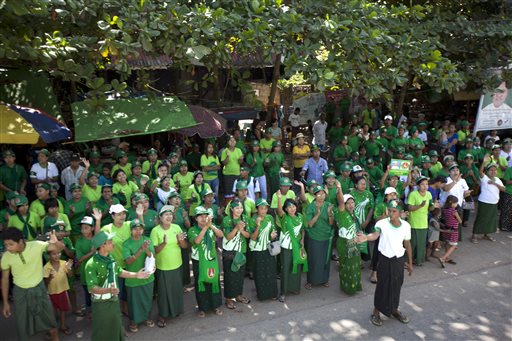YANGON, Myanmar — It’s about returning democracy to a nation held hostage to more than a half-century of military rule. It’s about hope for a better life for millions of desperately poor people. It’s about being fully embraced by the international community. But most of all, Myanmar’s general election on Sunday may prove to be opposition leader Aung San Suu Kyi’s moment of destiny — a chance to seize the victory the junta stole from her 25 years ago.

Members of military backed Union Solidarity and Development party watch performance from a campaign truck during an election campaign Friday, Nov. 6, 2015, in Yangon, Myanmar. AP Photo
“I believe in my heart that things are going to change for sure,” said lawyer Kyaw Thu Win, sitting in a sea of red party T-shirts and flags at a recent campaign rally that drew tens of thousands of ecstatic Suu Kyi supporters.
Suu Kyi’s National League for Democracy party and its chief rival, the ruling, military-backed Union Solidarity and Development Party, held final rallies Friday, the last day of campaigning before a cooling-off period.
Most analysts, observers and journalists who have toured the country are certain the NLD will win the elections — if they are free and credible. An NLD-dominated Parliament would be a democratic milestone for a country that was ruled by the military from 1962 to 2011, when — after intense international pressure — it handed power to a nominally civilian government led largely by retired generals.
The military still retains many powers, but a majority in Parliament would give the NLD the presidency and control over the shape of the government and lawmaking.
It will also give hope to many of the ethnic minorities who form 40 percent of the country’s 52 million people. Myanmar is home to some of the world’s longest-running insurgencies, fought in regions where ethnic groups are demanding greater autonomy.
“In general, these elections are important because they are the first real indicator of whether the democratic transition is going to take a big step forward or remain in a quasi-civilian middle ground for years to come,” said Thant Myint-U, a historian and government adviser.
Sunday’s elections are not without flaws, which raise concerns about their impartiality. The chair of the election commission is an unabashed supporter of President Thein Sein’s USDP. There have been complaints about voting list irregularities and a large number of disenfranchised voters. But with 11,000 local and international monitors overseeing 40,000 polling stations, election observers said they are hopeful any attempts at systematic wrongdoing will be spotted.
“We won’t be everywhere, but we’ll have a good sample,” said Jonathan Stonestreet, who heads a team from the Carter Center, which has overseen more than 100 elections across the globe. Free and credible elections, leading to a smooth democratic transition of power, are key to lifting remaining international sanctions, principally by the United States, which will lead to a flood of foreign investment.
Myanmar remains a desperately poor country. In a teeming, cacophonous slum in Yangon, the country’s biggest city, the election has brought hopes of a brighter future. Htay Aung, a 62-year-old house builder, has worked his whole life to lift his family’s standard of living. “We hope for a government that will develop the country and improve the lives of people like us,” he says, pausing to draw on a long cheroot.
Suu Kyi and the NLD won the last election they contested, in 1990, but the military refused to honor the results and kept Suu Kyi under house arrest over most of the following two decades.
Analyst Richard Horsey believes Sunday’s result will stand, however, even if the ruling party loses badly. That’s because the military has changed the constitution to protect much of the power it holds. It is guaranteed 25 percent of legislative seats, enough to block any constitutional amendments.
“The constitution … already contains the powers and bakes in the red lines of the military,” he said. “They have the authority they need over their domain of interest. And I think that means that transferring power is much less a risk and concerning to them that it was in 1990.”